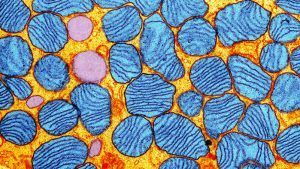Mitch Leslie in Science:

CRISPR, the genome editor celebrated as a potentially revolutionary medical tool, isn’t omnipotent. Mitochondria, the organelles that supply a cell’s energy, harbor their own mitochondrial DNA (mtDNA) and mutations there can have devastating consequences including deafness, seizures, and muscle weakness. Genome editing might be a remedy, but mitochondria appear to be off-limits to CRISPR. Now, two studies published this week in Nature Medicine reveal that two older genome-editing tools can slash the amount of defective mtDNA in mice bred to have a mitochondrial disease, counteracting the effects of the mutation. The proof-of-principle results could open the way for the first treatments for mitochondrial diseases. “These are remarkable findings that make it possible to even consider doing this in humans,” says mitochondrial biologist Martin Picard of the Columbia University Irving Medical Center, who was not involved in the work.
Turning these results into a treatment will be tricky. The genes encoding the genome editors had to be introduced by viruses, and researchers have long struggled to make similar gene therapy efforts work. But, “These are the right experiments to get ready to go into people,” says molecular geneticist Stephen Ekker of the Mayo Clinic in Rochester, Minnesota, who wasn’t connected to either study. In fact, both groups are already aiming to launch clinical trials. Descendants of ancient bacteria that took up residence inside early eukaryotic cells, mitochondria sport their own small genomes and a distinct set of proteins not encoded by genes in the nucleus. Each cell can contain thousands of these organelles, and mutations in mtDNA cause a range of illnesses. “If you take all the mitochondrial diseases together, they are one of the most common causes of genetic disease in humans,” says molecular biologist Michal Minczuk of the University of Cambridge in the United Kingdom, who led one of the research teams.
More here.
